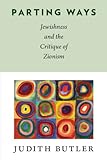Parting Ways: Jewishness and the Critique of Zionism (New Directions in Critical Theory)

価格: ¥0
カテゴリ: Kindle版
Judith Butler follows Edward Said’s late suggestion that only through a consideration of Palestinian dispossession in relation to Jewish diasporic traditions will a new ethos for a one-state solution emerge. Butler engages some forms of Jewish intellectual criticism of political Zionism and its practices of illegitimate state violence, nationalism, and state-sponsored racism. At the same time, she moves beyond communitarian frameworks, including Jewish ones, that fail to arrive at a radical democratic notion of political cohabitation, As important as it is to dispute Israel’s claim to represent the Jewish people, it is equally important, Butler argues, to show that a narrowly Jewish framework cannot suffice as a basis for an ultimate critique of Zionism. She promotes an ethical position in which the obligations of cohabitation do not derive from cultural sameness but from the unchosen character of social plurality. Recovering the arguments of Jewish thinkers who offered criticisms of Zionism or whose work could be used for such a purpose, Butler disputes the specific charge of anti-Semitic self-hatred often leveled against Jewish critiques of Israel. Her political ethic relies on a vision of cohabitation that exposes the limits of every communitarian framework, including Jewish ones, to overcome the colonial legacy of Zionism. Her own engagements with Said and Mahmoud Darwish are important to her articulation of the displacement of communitarian thought.
Butler draws upon some Jewish traditions of thought to consider the rights of the dispossessed, the necessity of plural cohabitation, and the dangers of arbitrary state violence, showing how they can be extended to a critique of Zionism, even when that is not their purpose. Butler engages thinkers such as Edward Said, Emmanuel Levinas, Hannah Arendt, Primo Levi, Martin Buber, Walter Benjamin, and Mahmoud Darwish. She revisits and affirms Edward Said’s late proposals for a one-state solution. Butler’s startling suggestion: Jewish ethics not only demand a critique of Zionism, but must transcend its exclusive Jewishness in order to realize the ethical and political ideals of living together in radical democracy.
Butler draws upon some Jewish traditions of thought to consider the rights of the dispossessed, the necessity of plural cohabitation, and the dangers of arbitrary state violence, showing how they can be extended to a critique of Zionism, even when that is not their purpose. Butler engages thinkers such as Edward Said, Emmanuel Levinas, Hannah Arendt, Primo Levi, Martin Buber, Walter Benjamin, and Mahmoud Darwish. She revisits and affirms Edward Said’s late proposals for a one-state solution. Butler’s startling suggestion: Jewish ethics not only demand a critique of Zionism, but must transcend its exclusive Jewishness in order to realize the ethical and political ideals of living together in radical democracy.
関連商品
- On Suicide Bombing (The Wellek Library Lectures)
- The Power of Religion in the Public Sphere (A Columbia / SSRC Book)
- What Does a Jew Want?: On Binationalism and Other Specters (Insurrections: Critical Studies in Religion, Politics, and Culture)
- Subjects of Desire: Human Reflections in 20th Century France
- Dispossession: The Performative in the Political (PCVS-Polity Conversations Series)